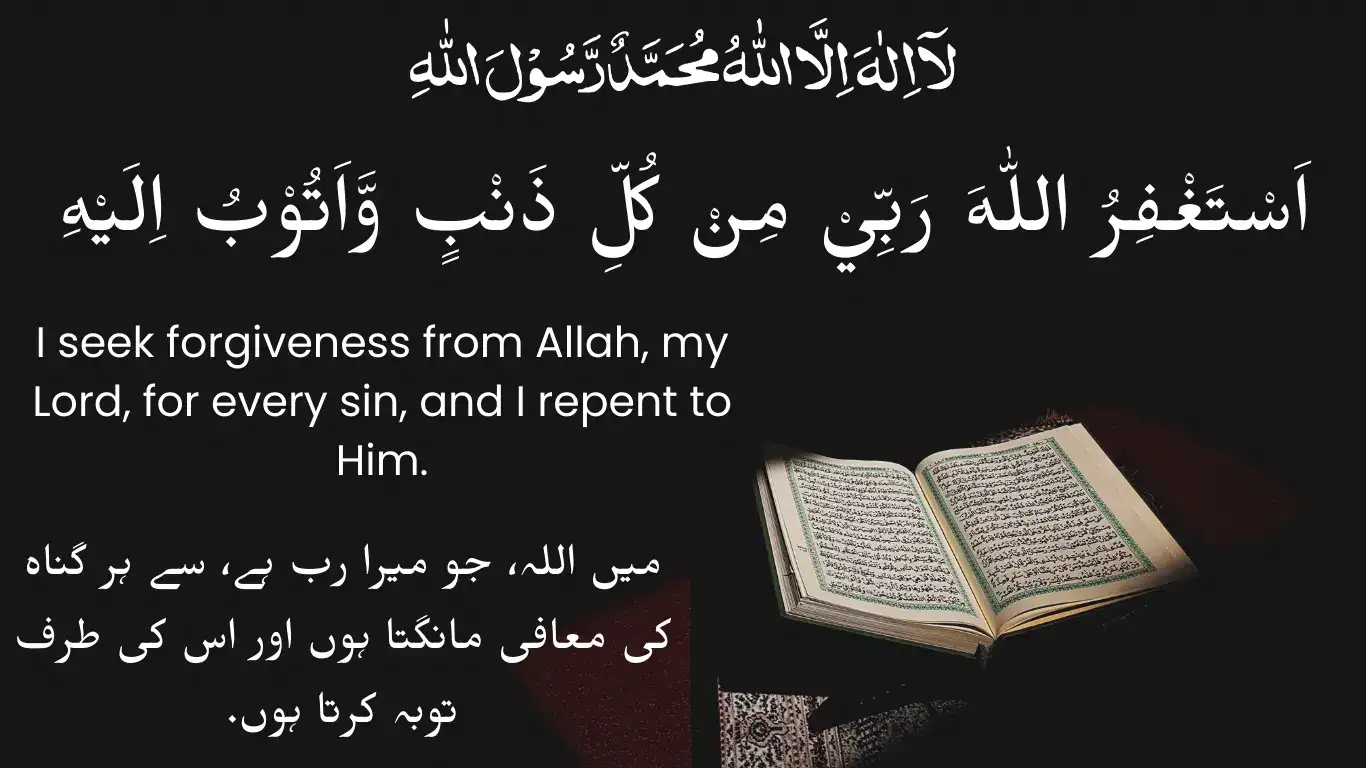Astaghfirullah Rabbi Min Kulli is a deeply meaningful phrase in Islam, often recited by Muslims to seek forgiveness from Allah. This simple yet powerful supplication reminds us of our need for repentance and the mercy of Allah, helping us reconnect with our Creator and strive for a better path.
Meaning of “Astaghfirullah Rabbi Min Kulli”
The full phrase, “Astaghfirullah Rabbi Min Kulli Dhambin Wa Atubu Ilayhi,” translates as “I seek forgiveness from Allah, my Lord, for every sin, and I repent to Him.” This dua emphasizes our reliance on Allah’s mercy and our commitment to repent sincerely.
- Arabic: اَسْتَغْفِرُ اللّٰهَ رَبِّيْ مِنْ كُلِّ ذَنْبٍ وَّاَتُوْبُ اِلَيْهِ
- Transliteration: Astaghfirullah Rabbi Min Kulli Dhambin Wa Atubu Ilayhi
- English Translation: “I seek forgiveness from Allah, my Lord, for every sin, and I repent to Him.”
- Urdu Translation: “میں اللہ، جو میرا رب ہے، سے ہر گناہ کی معافی مانگتا ہوں اور اس کی طرف توبہ کرتا ہوں۔”
Breaking Down the Meaning of Each Phrase
1. Astaghfirullah – I Seek Forgiveness from Allah
Astaghfirullah is a phrase commonly used by Muslims to ask Allah for forgiveness. Derived from the root word ghafr, which means “to cover” or “to forgive,” Astaghfirullah is a reminder of Allah’s infinite mercy. When we say Astaghfirullah, we are acknowledging our mistakes and asking Allah to forgive our sins and shortcomings.
- Significance: Repeating Astaghfirullah reminds us to remain humble and aware of our actions, helping us to purify our hearts and strengthen our relationship with Allah.
2. Rabbi Min Kulli Dhambin – My Lord, From Every Sin
The phrase Rabbi Min Kulli Dhambin translates as “my Lord, for every sin.” Here, we address Allah as Rabbi, meaning “my Lord” or “my Sustainer.” By specifically asking for forgiveness from “every sin,” we make a comprehensive plea, covering all our faults, whether known or unknown, big or small.
- Significance: This part of the dua reflects our sincerity and humility, showing that we are ready to let go of all wrongdoing and seek a fresh start with the help of Allah’s mercy.
3. Wa Atubu Ilayhi – And I Repent to Him
The phrase Wa Atubu Ilayhi means “and I repent to Him.” Atubu comes from the Arabic root word taaba, meaning “to return.” Repentance in Islam is not just about asking for forgiveness but also involves a commitment to change our ways and avoid repeating the sin.
- Significance: Repentance, or tawbah, is a vital part of Islamic faith. By saying Wa Atubu Ilayhi, we declare our intention to turn away from wrongdoing and align ourselves with Allah’s guidance, striving for a path of righteousness.
The Importance of Reciting “اَسْتَغْفِرُ اللّٰهَ رَبِّيْ مِنْ كُلِّ ذَنْبٍ وَّاَتُوْبُ اِلَيْهِ” in Daily Life
Engaging in regular istighfar (seeking forgiveness) brings numerous benefits:
- Purification of the Soul: Asking for forgiveness cleanses the heart from sins and brings peace to the mind and soul.
- Strengthens Faith: Repeating اَسْتَغْفِرُ اللّٰهَ رَبِّيْ مِنْ كُلِّ ذَنْبٍ وَّاَتُوْبُ اِلَيْهِ is a form of worship that strengthens our faith, keeping us mindful of our actions and our relationship with Allah.
- Brings Barakah (Blessings): According to Islamic teachings, seeking forgiveness brings blessings, helps resolve difficulties, and attracts Allah’s mercy.
How to Incorporate “اَسْتَغْفِرُ اللّٰهَ رَبِّيْ مِنْ كُلِّ” into Your Routine
Incorporating this dua into your routine can deepen your connection with Allah and enhance your sense of spirituality. Here are some practical ways to include it:
- Morning and Evening: Recite this dua during morning and evening prayers to begin and end your day with repentance and remembrance of Allah.
- After Salah: Make it a habit to recite اَسْتَغْفِرُ اللّٰهَ رَبِّيْ مِنْ كُلِّ ذَنْبٍ وَّاَتُوْبُ اِلَيْهِ after each salah to cleanse your heart and seek continuous forgiveness.
- Whenever You Remember: This phrase can be recited anytime. By repeating it regularly, you stay spiritually mindful and connected to Allah.
FAQs:
This dua means “I seek forgiveness from Allah, my Lord, for every sin, and I repent to Him.” It is a powerful phrase to ask Allah for forgiveness and show our intent to avoid repeating sins.
There is no strict rule, but reciting it multiple times daily is beneficial. The Prophet Muhammad (PBUH) encouraged frequent istighfar, so incorporating this phrase into your morning and evening routines or after prayers can be highly rewarding.
Saying “Astaghfirullah” reminds Muslims of Allah’s mercy and helps them seek forgiveness for their mistakes. It purifies the heart, brings peace, and strengthens one’s faith, making it a vital part of Islamic practice.
Let us embrace the transformative power of Astagfirullah. By sincerely seeking forgiveness from Allah, we unlock a world of divine mercy and grace. Let us make it a daily practice to recite this powerful dhikr and purify our souls. May Allah accept our repentance and grant us abundant blessings. Ameen.




